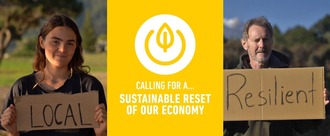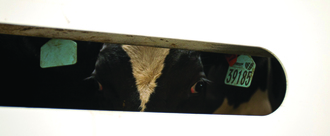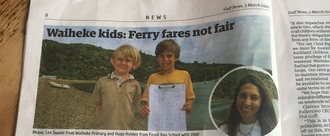-
COVID19: Re-set Our Economy SustainablySustainability has been at the forefront of New Zealand’s news, our elections, and spurred hundreds of thousands of kiwis to peacefully protest. Despite this, and the extremely urgent message science is giving us, there has been a distinct lack of action. COVID19, in an unexpected and undesirable way, has given us the opportunity to re-set. Our new normal does not mean going back to the ways we know are broken. Our new normal means re-setting how we live, work, produce and govern in a way that regenerates. To start to heal what we have done while living outside the biophysical limits of the Earth. This gives us, future generations and other species a fair chance. It will help prevent, and be more resilient to, future crises. This disruption is a time to re-think systems and unite business, government and NGO's. Unlike ever before, we have the means and motivation to collaboratively and fairly transition our economy for a sustainable future. It's clear that if this opportunity is not navigated properly, with courageous and informed decision making, the future we are borrowing from our Mokopuna (Grandchildren) will not be a bright one. The decisions now will make our bed for decades to come and they must be the right ones. Our Leaders have a moral, and legal (Paris Agreement), responsibility to create a strong, resilient, local economy that regenerates Papatūānuku (Mother Earth) and fosters actualised human wellbeing.3,023 of 4,000 SignaturesCreated by Shay Lawrence - CaliWoods

-
Partially reimburse University of Otago students for semester one and minimise university job lossesStudents at the University of Otago are dealing with a decreased learning experience due to the COVID-19 lockdown. Practical classes and field trips have all been canceled and all learning is via online lectures and sometimes zoom classes. As students, we are making the best of a bad situation but feel that we should not be charged the full course fees when we are not receiving the original course content in full. It is also important that the staff of the university have job security moving forward.20 of 100 SignaturesCreated by david coe
-
Invest in a healthy and flourishing planet for our future - a covid responseThe Government has shown a commitment to COVID-19 recovery and have indicated that it will make significant investment in infrastructure. To protect the planet and protect our future, it is important that this investment does not lock us further into the high-emission pathway we are on, as such investments will accelerate the climate and ecological breakdown. The Government has tasked the Infrastructure Industry Reference Group to present it with projects that are ready to start within six months. The projects that are selected will be pivotal in determining our future! We are afraid for our ecosystems, animals and people that projects which lock us into a high-emission and ecologically unsustainable pathway will be selected. To prevent this, and to achieve a future that is connected to a healthy and flourishing planet, we need to urge the Government to invest in transformation climate change projects. Further examples of possible projects include restoring our ecosystems, enhancing walking and cycling routes, and green tech innovations. Please sign this petition if you want to call on Government to invest in a healthy and flourishing planet for our future. Government seeks infrastructure projects https://www.beehive.govt.nz/release/government-seeks-infrastructure-projects200 of 300 SignaturesCreated by Hannah Riley
-
End Live Export at Port TaranakiLive export of farmed animals puts animals at risk, both on the sea voyage and when they arrive in their destination country. Onboard ship, animals can be thrown around in rough seas and some struggle to survive on the unnatural diet, so different from the paddocks they were raised in. At their destination, these animals can face an additional long journey by road and then an uncertain future. Port Taranaki started exporting cows at the start of 2020. In January, 4,800 cows spent 17 days at sea to their destination in China. This was followed by 3,300 cows being exported in March, again to China, and a third shipment of 4,450 animals in April. These cows are being sent to expand and strengthen the dairy industry overseas. Taranaki Regional councillors have chosen to allow these thousands of cows to be exported from Port Taranaki to places with lower animal welfare, transport and slaughter standards than New Zealand. Caring Kiwis don’t want this cruel trade to continue. [1] The export of live farmed animals for slaughter has already been banned, due to the suffering this trade inflicts on animals, but a loophole permits animals to be shipped for breeding purposes, which ultimately end in slaughter. The cows exported will likely be confined life-long in concrete factory farms and, once no longer “profitable” they will be slaughtered by means so cruel they are illegal in New Zealand. Most countries that New Zealand exports to do not require stunning prior to slaughter. This means that their throats are slit while they are still conscious. Taranaki councillors are putting profits before animal welfare. The live export trade is currently being reviewed by the Government and Agriculture Minister Damien O’Connor has expressed his preference for a conditional ban on livestock exports. [2] Despite this, live export ships continue to take tens of thousands of New Zealand cows to an uncertain future. The elected officials of Taranaki Council have the power to stop all future live exports from Port Taranaki. For the sake of animal welfare, live export needs to be stopped for good. PLEASE SIGN to end the cruel export of live farmed animals from Port Taranaki. References: [1] https://www.stuff.co.nz/taranaki-daily-news/news/120114883/protesters-make-stand-against-live-export-near-port-taranakis-gates [2] https://www.nzherald.co.nz/the-country/news/article.cfm?c_id=16&objectid=1227505213,959 of 15,000 SignaturesCreated by Liz Huston
-
COVID-19: Grant Emergency Benefits for MigrantsWe are global citizens. Aotearoa NZ must show a good example of manaakitanga. Our migrant community contribute hugely to our society, our diversity, the economy and workforce. Everyone needs a secure place to live and access to life's essentials at this time. Migrant communities are at risk of facing severe economic hardship due to loss of employment and the inability to return to their home countries due to travel restrictions around the world and the danger of COVID-19. If the government does not provide this emergency benefit, people may feel they have to fend for themselves and possibly break lock-down. That's a concern. We are all in this together and we must all support one another to get through this. Granting benefits to migrants is the compassionate and healthy thing to do.1,302 of 2,000 SignaturesCreated by Eliana Darroch
-
Abolish interest during mortgage holidays while the Covid-19 crisis occursBanks have only offered the same mortgage holiday terms applicable in ordinary circumstances (pre-pandemic). While other businesses are pulling out all stops to help and may not survive, banks are effectively doing nothing. We have been told that the recession arising out of this crisis will be far worse than the GFC, therefore the measures put in place need to be stronger. Many people are in greatly reduced circumstances due to lock down. Many have, or will, lose their jobs and may take some time to find a new one. In the short term this greatly affects young people with new mortgages, low income mortgage holders, and people who have had to re-finance recently due to unforeseen reasons. It also penalises people who have been paying diligently for some time, causing them to go backwards too. Landlords who hold mortgages over their properties may want to ease the pressure on their tenants finding rent, by decreasing their liabilities too. In the longer term adding interest increases household debt so people will have less spare cash to spend in the economy after the crisis, slowing recovery. Lack of money in society at this time can lead to increased social problems and crime. These are extraordinary times, we need extraordinary social measures. New Zealand banks are not following our Government’s and other NZ Business's good example, and we are well aware of the huge profits banks have been making in recent years. Your signature here will make a difference to the world we experience after this pandemic passes.60 of 100 SignaturesCreated by Miriam Isabelle
-
Pay increase for essential workersA lot of essential workers are in jobs with low pay and very little job security. They include supermarket workers, cleaners, truck drivers, aged care workers, food and beverage factory workers, mental health workers, ambulance drivers, rubbish collectors. They are now on the front line of this pandemic, providing food, fuel, care, supplies and various other products and services to us. Covid-19 has now put extra pressure on all these workers. It has placed them in a very vulnerable position, causing extra worry and stress, since many need to be in close contact with a lot of people. It often requires them to take precautions with their clothing and equipment, and in some instances, they have the expense and worry of living apart from their families. On top of all this, they are simply exhausted by sheer hard work. These workers keep our country running every day, even more so during this pandemic - let's pay them fairly for their work and also pay a bonus to say thank you and acknowledge the exceptional circumstances. 'Essential' supermarket workers should be paid more during outbreak, union says, Stuff, 27 March 2020 https://www.stuff.co.nz/business/120638053/essential-supermarket-workers-should-be-paid-more-during-outbreak-union-says Coronavirus: Ryman Healthcare gives essential workers pay boost https://i.stuff.co.nz/business/better-business/120646094/coronavirus-ryman-healthcare-gives-essential-workers-pay-boost Essential workers deserve a living wage https://www.livingwage.org.nz/essential_workers_deserve_a_living_wage10,586 of 15,000 SignaturesCreated by Jake Benge

-
Covid-19: Emergency housing plan5 April 2020: We have delivered this petition in an online event to MP Marama Davidson: https://bit.ly/3aOtAla For the update on housing since this petition began: https://medium.com/@actionstation/the-level-3-lowdown-on-housing-and-covid-19-72207cab54aa You can still sign to keep in touch with the campaign or add your visual support by sharing a photo at https://actionstation.org.nz/campaigns/emergencyhousingplan 🏠 No matter who we are, or where we come from - all of us need a safe place to call home. Yet for decades politicians have allowed the housing market to be driven by the demands of property speculators which has led to a housing crisis. And that was before the coronavirus hit. Because of the covid-19 situation and the inevitable economic downturn, many New Zealanders will lose their jobs, have their hours reduced, or be forced to self-isolate with little or no income. This will have a particular impact on those who are homeless, live in insecure or overcrowded housing, or have high rent and mortgage payments. The government must intervene now to ensure everyone has a home through this challenging time. The latest government announcement of a rent freeze and no-cause evictions give some relief but these measures do not go far enough. Government ministers are meeting in the next couple of days to make further decisions and we have the chance now to push for the best possible outcome for people renting, in insecure housing or who are homeless. The choices our Government makes now to help us weather the outbreak of this virus has the power to shape our communities and social systems for the better for decades to come. We can choose to look after everyone. To respond to the current emergency we ask for: 🏠 AN IMMEDIATE RENT AND MORTGAGE AMNESTY from paying rent or mortgages and a ban on all evictions throughout the covid-19 pandemic (to be extended for a period afterwards to help people recover financially and emotionally). Already, thousands of New Zealanders are living in unaffordable and insecure rentals, with the pressure always growing. An unexpected loss of income due to businesses closing down, job losses or the need to self isolate will make paying rent impossible and push people into homelessness. The government should provide renters and owner-occupiers with an amnesty from paying rent and mortgages, and to ban all evictions. Mortgage payments should be deferred interest-free. Rent payments should be waived instead of deferred. 🏠 LONG TERM RENT CAPS to enable people to recover financially, emotionally from covid-19. 1 in 4 households already spend 40% or more of their household income on rent and housing costs, and that proportion is greater for students and young people.[1] Renters are much more vulnerable to income loss and rent increases. Rent caps are about capping the amount of rent landlords can charge so that tenants are able to meet their housing costs. These will protect renters in this time of crisis but also longer-term in addressing the continual housing crisis we are facing. 🏠 THE GOVERNMENT TO BUY UNOCCUPIED HOUSES (ghost homes) and buildings on the private market for public housing for homeless people. Homeless people and whānau, including those living in overcrowded housing, need to have a secure and safe place to live especially when needing to self-isolate and protect themselves and others from the spread of COVID-19. There will be many more people who find themselves unable to afford private rentals. In the immediate term, the government should purchase empty ghost homes and buildings, making these permanent state homes. By bringing these unused homes into public ownership we will be able to provide safe and healthy state homes for homeless people and whānau.[2,3,4] 🏠 REMOVE ALL OBLIGATIONS TO PAY FOR THE COSTS OF TEMPORARY EMERGENCY HOUSING and reinstate this as a non-recoverable grant. People should not have to re-apply for emergency housing. People should not have to pay rent for emergency housing with no rental contract. The government recently made those living in emergency accommodation pay for a portion of the costs at a quarter of their income. We ask the government to go back to making emergency housing a non-recoverable grant so people are not made to go into debt. We also call on the government to remove any obligations to re-apply for emergency accommodation and prove to Work & Income that you have been looking for alternative accommodation. Having to do house visits for rentals may not even be possible during a Level 4 pandemic, and will cause extreme stress for people looking for housing. By standing united can we ensure collective wellbeing through this outbreak and rewrite the rules to ensure better health and homes for us all and the generations to come. Sign now and together we will send a strong message to the government that the time is now to guarantee safe, warm affordable homes. ⭑ ⭑ ⭑ Notes One in four households already spend 40% or more of their household income on rent and housing costs [1] Household income and housing-cost statistics: Year ended June 2019, Stats NZ : https://bit.ly/2y2rLCP There are over 40,000 homeless people in New Zealand and in 2018 there were 191,646 unoccupied dwellings, with nearly 40,000 in Auckland. [2] Severe housing deprivation in Aotearoa New Zealand, Kate Amore, University of Otago : https://bit.ly/3dlQB0t [3] 'Worrying' rise in empty homes in Auckland highlighted in Census 2018, Sep 2019 : https://bit.ly/3afAhg6 There are nearly 15,000 people and whānau on the waitlist for public housing but there are many more in need of safe and secure public rental housing but do not currently fit the criteria. [4] Housing crisis: Wait-list for public housing nears 15,000 households, NZ Herald, 28 Feb 2020 : https://bit.ly/2Ux9OE311,231 of 15,000 SignaturesCreated by Team ActionStation

-
Coronavirus: Emergency universal basic income for everyoneRight now, people and governments everywhere are rising to the huge challenge that coronavirus poses to our communities. What this virus has shown is that no matter who we are or where we come from, we are all in this together. It has also shown that, globally, governments can act quickly, in smart, assured and reasonable ways to manoeuvre the systems put in place to govern our lives so they support collective wellbeing. Around the world, governments have rapidly built new hospitals and put a freeze on rent and mortgage payments to help people survive and thrive in these trying times. In Hong Kong they’ve given every citizen $10,000 and in the US Trump is planning to give every person cash as soon as possible. The UBI, a regular no-strings payment to every person, is an idea made for these times. We already have this style of support for our eldery, with one of the lowest rates of elder poverty in the world, so what are we waiting for? A UBI would help give everyone in Aotearoa financial stability and ensure people don’t miss out, as they often do, in more targeted approaches. It would reduce administration costs, time and stigma for those reaching out for income support. It could increase entrepreneurship and enable people to do the work of caring for our communities through these difficult times. The trial would also provide valuable insight as to whether New Zealand should move toward a UBI permanently. There is a lot more that needs to be done to mitigate the impact of coronavirus - from helping people get support when they are sick, to making sure renters don’t face eviction, and people with mortgages or no home can keep a roof over their heads. But ensuring everyone across the country has enough money to get by will save lives. If you agree everyone should be guaranteed enough money to pay for basic essentials at a time like this, will you add your name to the petition now? HOW WOULD THE GOVERNMENT PAY FOR A UBI? There are several ways the government could pay for a UBI. They could sell bonds directly to the Reserve Bank. They could set up a public bank, chartered for this purpose, that would act on behalf of the Government. They could implement the recommendations made by the Victoria University of Wellington Tax Working Group: A Tax System for New Zealand’s Future. In 1935, the Reserve Bank printed money and lent it to the government to build lots of state houses. We have done this before and we can do it again. WHAT PROOF IS THERE THAT A UBI WORKS? Between 1974 and 1979, Canada ran a randomised controlled trial in the province of Manitoba, choosing one farming town, Dauphin, where every family was eligible to participate in a basic income experiment. The basic income benefited residents’ physical and mental health — there was a decline in doctor visits and an 8.5 percent reduction in the rate of hospitalisation — and high school graduation rates improved, too. Unfortunately, the trial was cancelled when a more conservative government came into power. The largest and longest UBI experiment in the world is in Kenya where the charity GiveDirectly is making payments to more than 20,000 people spread out across 245 rural villages. As part of this randomized controlled trial, which started in 2016, recipients receive roughly 75 cents per adult per day, delivered monthly for 12 years. Cash transfers have stimulated the economy and benefited not only the recipients themselves but also people in nearby villages. You can read more about all of the UBI trials here: https://www.vox.com/future-perfect/2020/2/19/21112570/universal-basic-income-ubi-map **** REFERENCES AND FURTHER INFORMATION: How China Built Two Coronavirus Hospitals in Just Over a Week: https://www.wsj.com/articles/how-china-can-build-a-coronavirus-hospital-in-10-days-11580397751 Coronavirus: France imposes lockdown as EU calls for 30-day travel ban: https://www.theguardian.com/world/2020/mar/16/coronavirus-spain-takes-over-private-healthcare-amid-more-european-lockdowns Steven Mnuchin: “We are looking at sending checks to Americans immediately”: https://www.vox.com/future-perfect/2020/3/17/21183627/trump-steve-mnuchin-checks-to-americans-cash Hong Kong’s cash handout could boost the economy by 1%, says financial secretary: https://www.cnbc.com/2020/02/28/cash-handout-could-boost-hong-kong-economy-by-1percent-financial-secretary.html Poverty and older people in New Zealand: https://nzccss.org.nz/work/older-people/poverty-and-older-people/ Call for UBI in NZ to ride out global depression: https://www.rnz.co.nz/national/programmes/afternoons/audio/2018739215/financial-impact-of-covid19-around-the-world It's time to move mountains to protect people – we need universal basic income: https://www.theguardian.com/commentisfree/2020/mar/18/its-time-to-move-mountains-to-protect-people-we-need-universal-basic-income And finally, a great TEDx talk on why we should give everyone a basic income: https://www.youtube.com/watch?v=aIL_Y9g7Tg011,360 of 15,000 SignaturesCreated by Anna Dean
-
Waive paywave fees for retailersWith the threat of a community outbreak of coronavirus we need to keep ourselves and our communities safe. By encouraging all shops to install paywave facilities we can improve hygiene with non-contact payments so bacteria aren’t spread between people. This simple action will almost certainly reduce the number of Covid-19 cases if there is community spread. It will also reduce prices on goods and services as the fees won’t be passed onto customers. This will relieve the stress for many people who may have lost work or have reduced hours. However at present paywave is too expensive for many businesses to install. Banks have a role to play in keeping us safe and with the profits earned in previous years are well-placed to be able to offer this service. They can reduce fear and help keep daily lives normal, and make the cost of living a little bit easier. Coronavirus: 'No Paywave' is now a public health issue, NZ Herald, 16 Mar 2020 https://www.nzherald.co.nz/business/news/article.cfm?c_id=3&objectid=12317062 High Paywave fees from banks are making goods and services 'more expensive for everyone', 1 News, July 2018 https://www.tvnz.co.nz/one-news/new-zealand/high-paywave-fees-banks-making-goods-and-services-more-expensive-everyone-retail-nz-says Ice cream chain cans Paywave after $20,000 fees shock, NZ Herald, March 2019 https://www.nzherald.co.nz/business/news/article.cfm?c_id=3&objectid=1221008734 of 100 SignaturesCreated by Annie Stanley
-
Record our classes in response to COVID-19➡️PLEASE RECORD ALL OUR CLASSES Please record all our classes, lecturers, tutorials and workshops. ➡️PLEASE MAKE ALTERNATIVE ARRANGEMENTS WHERE RECORDING IS REALLY NOT POSSIBLE We understand that not all classes can be recorded. We’re not talking about classes that are best taught in a face-to-face context, because we know that showing up to class is the best option. We are talking about laboratories, practical courses and trades classes that for reasons of practicality are not able to be recorded. Alternative arrangements could look like: 1) Rearranging the course schedule so that all physical workshops and laboratories are taught in an intensive block period once the progression of COVID-19 has slowed. 2) Putting all course materials, including readings and additional materials online. 3) Adjusting the assessments or the assessment schedule so that students do not have to be physically present in classes. This could include relaxing requirements about physical assessment hand-ins. ➡️PLEASE SUPPORT STUDENTS Class recordings alleviate inequity in our community, as they ensure that students who need to self-isolate for personal reasons are not punished for doing so. However, there are issues that need to be catered for. This includes making financial and practical support available to students and staff who do not have access to the internet or a device. It also means continuing to pay ALL staff, including those on casual contracts such as students who work as tutors, demonstrators or research assistants. If classes are cancelled, teaching staff should be supported to record classes off campus, or host classes over Zoom. We would also appreciate increased availability and monitoring of hand sanitizers, soap and clean paper towels on campus to prevent the spread of germs. We understand that there are financial limitations to the tertiary sector recording all classes. We strongly encourage you to collaborate and work together, and to support smaller institutions in your region. In a public health crisis like this, it is far better for everyone to work together. Ngā manaakitanga, New Zealand Union of Students’ Associations Te Mana Ākonga Tauira Pasifika Auckland University Students’ Association Massey University Students’ Association Albany Students’ Association Otago University Students’ Association Student Connection Weltec and Whitireia Students Association at Wintec Lincoln University Students’ Association Victoria University of Wellington Students’ Association Massey University of Wellington Students’ Association Waikato Students' Union912 of 1,000 SignaturesCreated by NZ Union of Students' Associations (NZUSA)

-
Include the Waiheke Ferry Service in Auckland Transport's 'Free Child Weekend Fares'Auckland Council has the vision of encouraging more families onto our buses and trains, and encourage the next generation of Aucklanders into becoming public transport users. This is why it doesn't charge 5 to 15 year olds fees for using public transport in the weekends. However children on Waiheke have been left out. With the current Waiheke child fare $21 return, many of us are unable to travel to Auckland. This is compared to a similar trip from Manukau Station to Britomart station on train which is a total of $5.80 return. The use of the ferry in the weekend will make a considerable difference to our lives. We will now be able to attend our sports games, swimming lessons, doctors’ appointments and to use the facilities off-island in greater Auckland. Currently, the “Free travel for children in the weekend” initiative covers ALL of Auckland’s other public transport modes except our Waiheke ferry service. This includes the Devenport ferry service. We think this is astonishingly unfair since the Fullers monopoly service is unsubsidised and the most expensive ferry travel on the Auckland Harbour. We have Gold Card for Seniors after 9 every day of the week, so why not a one for Juniors at the weekend? Waiheke was not exempt from fuel tax which goes to maintaining transport loops. Our rates go to Auckland Council to maintain museums, swimming pools and recreational facilities that need to be available to us as Aucklanders on the same terms as elsewhere in the city. We hope that you can see from these signatures that this initiative will make a considerable difference in our lives. https://ourauckland.aucklandcouncil.govt.nz/articles/news/2019/09/free-child-fares-at-weekends-on-public-transport/485 of 500 SignaturesCreated by Clarissa Mackay











.png)
.jpg)